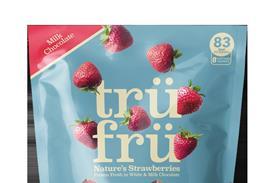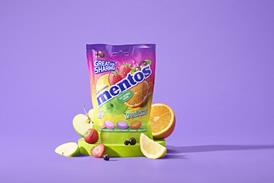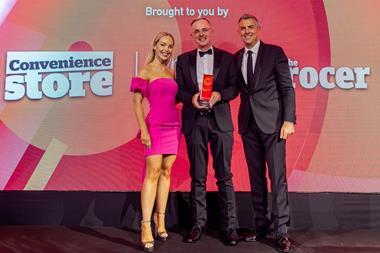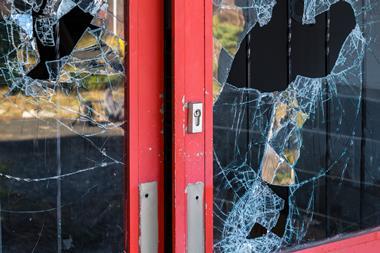Raj Aggarwal, Three Spar stores in Leicestershire and Sheffield
This year Raj opened a new store and coffee bar, as well as taking on a Spar franchise
Mark Canniford, Spar Weston-super-Mare, Somerset
Despite a colder-than-average summer, Mark’s business has held up thanks to the store’s post office
Jai Singh, Go Local Extra, Sheffield
After many months of issues with rent and planning permission, Jai has extended his store into the next door unit and moved to Go Local Extra
Guy Warner, Five Warner’s Budgens stores in Gloucestershire, Warwickshire and Worcestershire
Guy has spent the past 12 months adding extra services to his stores
Has this year lived up to expectation from a business perspective?
Raj: Yes and no. We have now opened a new store in Market Harborough in an old council building, but we had hoped to open last December. We’ve also opened a coffee shop/wine bar in the same building under the brand Insomnia. On 19 November we took over our third store in Hackenthorpe, near Sheffield. It’s been an exciting, challenging year, but we’ve worked hard to overcome any issues.
Mark: It was a bit disappointing because of the weather. It wasn’t the best for summer trade. However, we had a post office installed last year so trade has been okay despite the bad weather. The post office has done extremely well and overall the store’s done pretty well. On bad days we do still take more money than we used to.
Jai: It’s difficult to answer because prior to July we were a Premier store and now we are Go Local Extra and we’ve doubled our floor space. It’s a different approach. We were hoping to have the refit complete before the start of summer, but it took longer than expected. The planning permission took up a lot of time - we tried to purchase the store, but ended up having to lease it from the council. We finally opened on 11 July. We have seen an uplift in sales because of the refit, though, and because we are closer to the community now.
Guy: I think this year has lived up to expectation. I don’t think we were under any illusions this would be an easy year, neither did I think it would be awful. It’s a very competitive market, but convenience seems to be where it’s at.
What has been your business highlight of 2015?
Raj: Getting my Spar store open. It was my biggest hurdle and my biggest highlight. Probably the longest refit in history - 18 months!
Mark: The fact we managed to hold up in a poor year, when supermarkets and other stores in the area were struggling. We had a refit to accommodate the post office in December 2014. It’s designed for the customer to get the best journey - a little bit more supermarket-like. Now the customers think it’s the best-looking store in the whole of Weston-super-Mare.
Jai: The highlight was making the transition from one symbol to another and expanding our business. Asda came two years ago and we felt we needed to focus on the value side of things, but now we are concentrating on increasing basket spend. Changing symbol has helped us find our niche. Now the customers complement our range, rather than the cost.
Guy: Seeing what else you can do with a convenience store. We’ve put in a coffee shop, a store within a store - Cook frozen food, and added a full main post office. Development has come in the form of giving people other reasons to visit, whether through service or products, and hopefully drive footfall. We’ve proven we can add a string to our bow and to see people visiting your store for a different reason offers comfort.
How did you get through the tough times?
Raj: I said I’m not going to let people get the better of me. My wife and brother helped me through it, and my friends.
Mark: Dealing with security issues has been tough, but I’m part of the town centre security team. We have an in-store radio which links all the businesses. We give descriptions of the shoplifters to each other so we can look out for them.
Jai: Parfetts’ have been very supportive. We were over-budget for the refit work, but the priority was to make sure the store was exactly how we wanted it to be. We made sure we did things the right way and believed in what we were trying to achieve.
Guy: We’re trying to innovate. We’re trying to give customers new reasons to visit. That’s with one eye on maximising opportunity and one eye on trying to protect against competition. With more than one string to your bow you are in a better place to survive and be a destination store in your own right and have a USP.
What is the biggest change you’ve made to your business this year, and what have been the results of this?
Raj: If you look at the new store it’s a totally different concept. We decided to make it foodie and really worked at it; it’s big on food to go. In our Wigston store, the biggest change is that we have moved from Londis to Spar. It’s been great and we love working with Blakemore. Londis put me on the map without a shadow of a doubt, but it was time to move on.
Mark: The biggest change is going on now. The pension scheme has changed the people I have to employ. I’m employing younger people and people who won’t qualify for the workplace pension. MPs are totally oblivious to the complexity of the auto-enrolment pensions. The average set-up cost is £1,000.
Jai: The refit was our biggest change. By doubling the space we were doubling the amount of energy we’d use, so we wanted to make the store as efficient as possible. We’ve had solar panels fitted, LED lighting throughout and more energy-efficient refrigeration.
Guy: Moving into other business sectors. The post office has seen real success. We’ve grown post office values and increased footfall in the store. We have tried to give the post office a true identity and made it a proper post office so the queuing experience doesn’t inhibit the store and the store doesn’t affect the post office. With the two we’ve done, on footfall and sales and revenues, it’s a win-win.
Who or what in the industry has inspired you?
Raj: Roli Ranger is a great retailer. He’s gone to New York and abroad with the Association of Convenience Stores and inspired lots of people. He helped me think outside the box and helped me put all this together.
Mark: The Co-op inspires me. I like what they do. If I’m nowhere near one of my shops I’ll use a Co-op. Their range and their set-up is always good. It makes me go back and look at my store and make changes. I think they are a market leader.
Jai: Dee Sedani is constantly sourcing new technology and looking to be innovative. Roli Ranger, Sunder Sandher and the Cheemas have been in the game a long, long time, too. I’ve looked to see what they’ve been doing. It’s not good to completely copy another store, though, because you need to know what your community wants.
Guy: Everybody’s looking at what the world is doing in convenience - convenience coffee shops, convenience multiples, people branching into our sector such as Greggs and WHSmith. We’ve got inspiration everywhere. Everyone is trying to invade our space. In one way that’s negative, in another there are lots of opportunities to see good ideas and be inspired.
What have your customers been telling you over the past year about what they want from their local store?
Raj: Customers want good prices, they want to see nice clean stores, a friendly environment and they want to feel wanted. They want to feel a million dollars when they walk out the store and we’ve been doing all that. Most independents thrive on the fact their customer is king. We are different to the big boys; we are there to listen, we are there to have a two-minute chat and make them feel good. That will always set us apart.
Mark: People want a good and friendly service and consistency in range and products. It’s not all about price. They want a full, tidy and clean store. We don’t have gaps in the shop. We have a saying ‘Mind the gap’.
Jai: People want choice. With Premier you have a contracted spend and we could only sell what they had in the Booker cash & carry, but our customers want more than that. When I decided to double the size of the store I knew the range just wasn’t big enough, which is why we decided to leave. We’ve been told by customers that they’re happy with the increased range and the new products such as the hot food to go and the high-quality lines. We are getting both sets of customers now - private house customers and those in social houses - and we’ve got the balance right.
Guy: They’re saying: “We love the convenience, love the independence, love the local, but we also want something for nothing”. We are not immune to the fact the world sees discounters as the benchmark. It’s almost impossible to do, but they are saying they love the innovation and they love local, but they also like it for an Aldi price. But I think convenience shouts louder than price as long as the price is not stupid.
What has been your biggest learning of 2015?
Raj: The biggest learning is don’t get complacent. Work hard, play hard and fight for what is yours. This world is all about the big boys coming into our sector so we’ve got to fight them off. We’ve got to be better than them and be one step ahead. We can be better because we can change at the drop of a hat, whereas they have to go to a board meeting.
Mark: The benefit of adding the post office has been my biggest learning. This year, for the first time, because of the post office we kept the customer flow coming through despite the bad weather.
Jai: You never really know your customer. You get an idea of what they want, but it’s never the case that you know them. With the change in trends and markets and products, your customer is changing. You have to continuously monitor their habits and make sure you don’t rest on your laurels. When competition landed on our doorstep it hit us hard. Although we’d been in the store seven years our customers weren’t choosing to shop with us. That’s when we realised we had to evolve.
Guy: That we can’t stand still. We’ve got to evolve, we’ve got to keep moving.
THE HIGHS
Which area of the business has proved to be the most successful for you over the past 12 months?
Raj: Most areas are working and thriving. We are sweating to make sure every square foot works and in the new store the artisan products have worked really well. In terms of customers and footfall the coffee shop/ wine bar has been a big success. It’s taken off without any advertising. It’s just flown. On the same street we have five shops selling coffee and one right opposite. But we knew we had a better coffee and we could beat them hands down, and we have. Everyone who comes in tells us how good the coffee is.
Mark: Food to go. It’s the highest profit earner and it has been consistently good all year.
Jai: Fresh and chilled. We had a metre bay for milk, eggs and bread and cakes, now we’ve got 2.5 metres for just bread and cakes. We’ve got a lot more fresh fruit and veg, fresh meats, and curries to go from a local restaurant.
Guy: The new post offices have given customers tangible reasons to visit, and broadened our offer.
THE LOWS
What’s been the toughest time for you in 2015?
Raj: Trying to get the new store open. We had lots of problems with the council. We weren’t allowed into the building at one stage - that was my lowest point, where I almost felt I needed to throw in the towel.
Mark: Shoplifting has been horrendous this year. It’s a day-to-day occurrence now and multiple times a day, and those are the ones we are catching. The people stealing today just don’t care if they are caught. There’s no deterrent and no punishment. The politicians don’t seem to have any awareness of the impact it has on the retailer or the retailer’s family. They say “just price your goods accordingly”, but that’s not realistic. We price our goods to sell because we need them to sell and people are very price-aware.
Jai: The toughest time was the refit - all the paperwork and red tape. We’ve got a young family so getting the work-life balance and getting everything off the ground was hard.
Guy: Cost and competition - the two dreaded Cs. In reality, where I see the business is where costs are racing forward at a rate that’s terrifying. With competition, it’s more the threat, what’s in the planning stage, rather than what’s already come this year. We are preparing for what’s coming.
















![C-Store_Champions_logo-CHOSEN[1] 2023](https://d2dyh47stel7w4.cloudfront.net/Pictures/380x253/6/5/7/301657_cstore_champions_logochosen12023_817064.jpg)




No comments yet